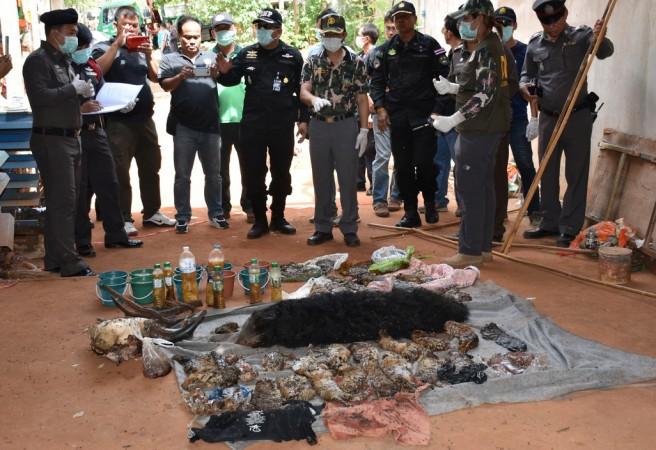
Thai police authorities on Thursday caught a monk who was trying to flee the "tiger temple" with tiger skins and fangs. The discovery comes a day after police found bodies of 40 tiger cubs inside a freezer at the temple.
Agence France-Presse quoted Adisorn Noochdumrong, the Deputy Director of Thailand's parks department, as saying: "Today we found found tigers skins and amulets in a car which was trying to leave a temple." He added that a search of the quarters of several monks revealed more body parts, increasing the haul to two full-body tiger skins, around 10 fangs and dozens of smaller pieces of tiger fur on Thursday.
About the tiger cub bodies found on Wednesday, according to BBC, Police Col Bandith Meungsukhum was quoted by AFP as saying that the cubs would have been one or two days old, but they were unsure as to how long they had been dead. The report said that there will be a DNA test to see whether the cubs were related to the other tigers at the temple.
Wildlife authorities, animal rights groups and conservationists in Thailand have for long accused the temple authorities of being involved in wildlife trafficking, animal abuse and illegal possession of carcasses and endangered species. Activists and former workers have claimed that tigers are mistreated and kept in concrete cages.
AFP reported that the temple authorities have also been accused of making huge profits by selling animals and tiger parts on the black market for medicine use.
The temple has consistently denied such allegations.
The agency quoted the police as saying that no charges will be filed against the temple since the case is still being investigated.
Authorities began the operation to move all 137 tigers from the temple premises after receiving a court order to do so, BBC reported. Dozens of them have already been moved.
Previous raids at the temple had revealed that the temple was keeping dozens of hornbills, jackals and Asian bears without proper permits.
The temple has been a popular stop for tourists for decades. They are allowed to pet and be photographed with the animal, which activists claim are heavily sedated, by paying a fee.











![Priyanka Chopra congratulates Mannara for winning GQ award; latter says 'Didi we will celebrate' [reactions]](https://data1.ibtimes.co.in/en/full/797303/priyanka-chopra-congratulates-mannara-winning-gq-award-latter-says-didi-we-will-celebrate.jpg?w=220&h=138)





